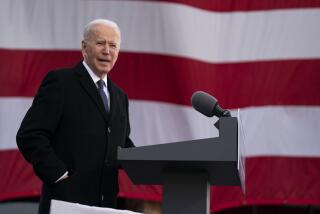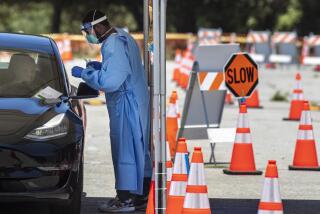Government Vows Private, Accurate Drug Tests
- Share via
WASHINGTON — Forging ahead with its anti-drug campaign despite legal uncertainties and worker opposition, the Reagan Administration said Thursday that its drug testing program will ensure privacy for the testing of federal employees and high accuracy of test results.
“These guidelines provide the greatest possible privacy for the individual, consistency in testing procedures, security for specimens and accuracy in test results,” Health and Human Services Secretary Otis R. Bowen said in announcing the rules for widespread testing of the federal work force.
The screening plan--comparable to programs gaining favor in private industry--would require two positive urine tests and an evaluation by a physician before a worker could be referred for treatment or disciplined for using illicit drugs. Toilet bowl water at testing sites would be dyed blue to prevent employees from diluting urine samples, and lab workers would check the temperature of the sample to ensure that workers had not substituted specimens.
Aim of Rehabilitation
Atty. Gen. Edwin Meese III pledged that the tests would be “virtually 100% accurate.” Although workers could lose their jobs for drug use--typically on a second offense--Meese said that rehabilitation, rather than the firing of workers, is the Administration’s purpose in implementing the testing program.
Federal employee unions--which have opposed the testing program since President Reagan announced his campaign for a drug-free federal workplace in September--branded the proposed procedures humiliating and predicted that federal courts would strike down the plan.
“They’ve insulted the integrity of the federal work force by suggesting they need to conduct drug tests,” said Red Evans, spokesman for the National Federation of Federal Employees, which represents more than 150,000 government workers. “Now they add insult to injury by suggesting they’ve got to do all this Mickey Mouse to prevent some kind of clandestine conduct on the part of federal employees to avoid the tests.”
Evans’ union and two others, together representing over a million federal workers, are the plaintiffs in a lawsuit pending before U.S. District Judge Robert F. Collins of New Orleans that seeks to have the Administration’s sweeping urinalysis program declared an unconstitutional invasion of privacy.
Action in the case is awaiting a federal appeals court’s review of Collins’ ruling in a separate case that a U.S. Customs Service testing program was unconstitutional. Other district judges around the nation have struck down drug-testing plans, but in two appellate cases--involving prison guards and jockeys--such programs have been upheld.
Despite the unsettled legal status, Meese and Constance J. Horner, director of the federal Office of Personnel Management, said that they see no legal reason not to press ahead.
Elaine Kaplan, a lawyer for the National Treasury Employees Union, said that federal unions probably will seek a preliminary injunction in the New Orleans litigation to block any agency from beginning testing before Judge Collins rules.
And at the Justice Department, at least two lawyers have told the Washington chapter of the American Civil Liberties Union that they might be interested in acting as plaintiffs in a suit challenging whatever plan Meese proposes for his staff, according to ACLU attorney Arthur B. Spitzer.
Staff writer Ronald J. Ostrow contributed to this story.
More to Read
Sign up for Essential California
The most important California stories and recommendations in your inbox every morning.
You may occasionally receive promotional content from the Los Angeles Times.













